Practice is a beautifully designed journal, an elegant compilation of literary (prose and verse) and visual work (photography, paintings, and graphics) that successfully mines the past and present. The creators preface their work as well as being prefaced themselves with that ever-present brief bio. Most artists and authors are presented through multiple or multi-part works.
NewPages Blog
At the NewPages Blog readers and writers can catch up with their favorite literary and alternative magazines, independent and university presses, creative writing programs, and writing and literary events. Find new books, new issue announcements, contest winners, and so much more!
The Fiddlehead’s 25th Annual Literary Competition Winners
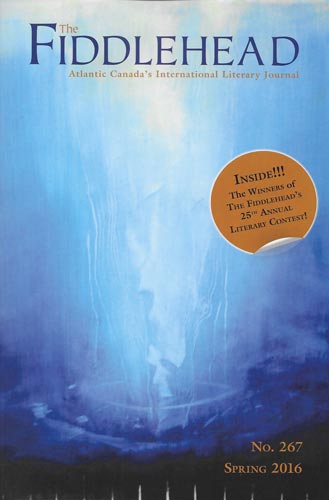 The Spring 2016 issue of The Fiddlehead features the winners of their 25th annual literary competition:
The Spring 2016 issue of The Fiddlehead features the winners of their 25th annual literary competition:
Ralph Gustafson Prize for Best Poem
Michael Eden Reynolds, “False Dichotomy or Monocot”
Honorable Mentions
Alison Goodwin, “Consumed”
Jeff Parent, “Made By Robots”
Short Fiction First Prize:
Brent van Staalduinen, “Skinks”
Honorable Mentions
Sarah L. Taggart, “The Way It Is In A Place Like This”
Cathy Kozak, “Dirty Girls of Paradise”
These works can be read on The Fiddlehead website along with commentary from Editor Ross Leckie on the winning entries.
Spread the word!
Call: Review – 2005
Call doesn’t include contributors’ notes, but few of these poets require them. The twenty poets represented here include Diane Wakoski, Annie Finch, Peter Gizzi, Virgil Suarez, Rachel Hadas, Nathaniel Mackey, Cole Swenson, Mary Jo Bang, and Jerome Rothenberg, among other poetry greats.
Spread the word!
Bird Dog – Spring 2006
Enclosing 76 pages of innovative wordplay by contributors, Bird Dog constitutes a thin journal. But the density of material it contains ranks Bird Dog’s seventh issue among my favorites, one of the reasons for which is the cover—an electric orange with many dogs howling at a birdlike black gnash. My first dive into the material brought to face a labyrinth of giddy texts, where sentences sprang in every direction with ease. Most works deserve praise for their innovation.
Spread the word!
CUE – Winter 2006
This slender, elegant prose poetry journal is full of rhythmically lucid, semantically challenging works. The digital ululations of Andrew Zawacki’s “Roche Limit” crackle with imagistic suggestiveness never yielding to static; Jason Zuzuga’s tight-lipped description of abandoned cargo containers in “Donald Judd” proves that “nothing” can be bordered, defined, organized, and given a delightful shape. Most successful are David Lehman’s wry facsimiles, particularly “Poem in the Manner of Ernest Hemingway.”
Spread the word!
The MacGuffin – Spring/Summer 2006
Each text in this issue of The MacGuffin is precisely located to aid the journal’s reading. Consider the opening lines of the first piece, Sara Lamers’s poem “California, Long Distance”: “Let’s drift through these looming / vineyards all afternoon.” Then wade into inter-national and inter-cultural exchanges in Elizabeth Khan’s “Saeeda” and Efrem Sigel’s “The Boy Who Always Told the Truth,” the former a family saga set in Pakistan, the latter a disillusioning tryst of a volunteer teacher in one of the African nations so terribly in need of things other than volunteer teachers drifting in and out of their deserts. The thick middle pages are full of imaginary leaps through age and time. In Oyri Thuhp’s “No Eyewitness” an old people’s home has residents fighting over a glass eye, mulling over a love triangle and determined to be crowned monarchs of their dotage. There’s a parable, “The Poet,” by Herman Hesse, and it blends into the issue as well as the poignant, and just enough photographs. Lynn Pattison, a late-but-resplendent-bloomer poetess is especially featured, with an interview and six poems, the first of which, “Catching Her,” is beyond compare in its evocative accuracy. It opens with: “Four minutes ago, the light told a different story, / but the man holding the camera wants this one.” After this halfway point the texts begin to embrace disintegration and a nostalgic longing develops until it is at crescendo near the end. Near the back pages are the aptly placed “Poetry Reading, State Prison” by Shelby Allen, which ends with “becoming what you are capable of”; and Connie Harrington’s “Texas Armadillo” flash piece “Texas Armadillo,” in which the said animal is “alive” and induces a man to reach for his “wife’s hand, and hold on tight.” What an armadillo. What an issue!
[www.schoolcraft.edu/macguffin]
Spread the word!
The Portland Review – Spring 2006
The 50th Anniversary issue of Portland Review offers a mixed bag of poetry, fiction and photography. The editors favor prose poems and unpretentious narrative verse, which is of varying quality. The fiction, however, is quite appealing, including “Plenty of Room in Heaven” by Jonathan Evison, which kick-starts the journal. The narrator writes of a depressed former philosophy professor: “He even went so far as to devise what he called the Sweats to Pants Ratio (S.P.R.), by which success was measured relative to the number of days a week one spent in casual versus formal attire, formal being anything with pockets.”
Spread the word!
Zahir – Winter 2006
Why did it take me so long to read this magazine? Like so many, I have shied away from “speculative fiction” not sure exactly what genre it might be (a controversy even among those who favor it), but what I have found here is a rediscovery of why I (like so many) was fascinated with Mary Shelley’s Frankenstein and Ray Bradbury’s Fahrenheit 451. And like those timeless classics read in my college days, Zahir is a journal I would highly recommend to teachers of short story and sci-fi/fantasy lit.
Spread the word!
The Hollins Critic – December 2005
The Hollins Critic publishes a single, digestible piece of criticism in each of its five issues per year. This issue George Garrett examines the genre of the Hollywood novel with special attention paid to the work of Bruce Wagner. The journal’s economy and presentation, rather like a chapbook, makes the sometimes unenviable task of reading criticism more palatable. This is only aided by Garrett’s easy-going prose and obvious love of Wagner’s work. Garrett argues that the Hollywood novel, defined as “stories about movies and movie people,” is a “conventional, self-reflexive, allusive arrangement and rearrangement of various versions of itself.”
Spread the word!
subTerrain – Number 43, 2006
A theme-based literary magazine from Vancouver, the fiction, poetry, commentary, memoir, and photography in the current issue of subTerrain explore the idea of “neighborhoods,” both fictional and real. Much of the work is vivid, raw, and gritty (poems Christopher Shoust and John Roberts, stories by Hungarian writer Grant Shipway and Katherine Cameron). Given the edginess of so much of the work, Diana E. Leung’s commentary, “Buying-in-Security: Safe Zones and Sanitized Living” about the culture of fear in which we live and the building of crime-free zones in Toronto seems appropriate, and given the times in which we live, it is satisfying to find a thoughtful commentary about these issues in a literary magazine.
Spread the word!
Tampa Review – 2006
This is my favorite issue of this handsome annual yet. It’s smartly edited, with a collection of pieces that seem very much to belong together and to belong in exactly the order in which they appear. The issue opens with a silver print by Jerry N. Uelsmann of a sky inside a hand holding up both a house and a naked shadowy figure looking to one side, but approaching the house. On the facing page, Kathleen Spivack’s poem, “Seeming to Happen,” concludes “I, who thought myself ‘indecisive,’ find indeed I was only waiting: / waiting for you, for me, for a path, for a way to walk into this / painting.”
Spread the word!
TriQuarterly – 2005
Guest editor Kimiko Hahn has compiled a collection of poems and stories based on research, paintings, photographs, and other source materials, several essays about writers’ relationships to influences and original sources, and lengthy contributors’ notes describing the writers’ processes and approaches. Hahn provides an introduction to the issue in a poetry/theory style, “Notes Re: Trawl/Troll,” and includes two poems of her own in the issue. As a reader who is partial to research-based writing, I was especially interested in this issue, but I am confident that readers with no particular connection to this type of work will find a great deal to appreciate here.
Spread the word!
Hunger Mountain – Spring 2006
Ruth Stone Prize in Poetry judge Nancy Eimers, prose guest editor Victoria Redel, and poetry guest editor Roger Weingarten have selected strong, original work for this very satisfying issue. Poet and novelist Redel offers a short and fabulously poetic introduction to the “rigorous fictions” she has chosen in which she praises “the surprise and heart-stopping happiness of a sentence.” I don’t know if it is by coincidence or design that she has selected several pieces by excellent poets who, like herself, are also successful prose writers, including work by Sheila Kohler, Terese Svoboda, and Richard Katrovas.
Spread the word!
Rattle Features Los Angeles Poets
 In addition to the open poetry contributions, Rattle #52 features a tribute to 21 Los Angeles poets, and an interview with L.A. native-born poet Brendan Constantine, author of collections Letters to Guns (2009), Birthday Girl With Possum (2011), and Calamity Joe (2012).
In addition to the open poetry contributions, Rattle #52 features a tribute to 21 Los Angeles poets, and an interview with L.A. native-born poet Brendan Constantine, author of collections Letters to Guns (2009), Birthday Girl With Possum (2011), and Calamity Joe (2012).
Rattle editors write, “Los Angeles is our home city, but we’re an international magazine and not especially sociable, so we wanted to peek in and see what’s happening in the local scene. Greater Los Angeles is home to almost 20 million people, including a very eclectic but widely dispersed poetry community: Take your pick of the many poetry readings and open mics happening daily—but good luck driving there! It’s also a city full of complicated history and cinematic beauty. As always, we put out an open call for submissions, and were impressed with what Angeleno poets had to offer, including a love poem for Los Angeles by L.A. Poet Laureate Luis J. Rodriguez.”
Other Angelenos featured inclue: Resa Alboher, Allan Aquino, Chanel Brenner, Brendan Constantine, Jack Cooper, Alejandro Escudé, Alexis Rhone Fancher, Alan Fox, Jack Grapes, Ron Koertge, Deborah P. Kolodji, Lester Graves Lennon, Ruth Madievsky, Risa Potters, Raquel Reyes-Lopez, Lynne Thompson, Amy Uyematsu, Charles Harper Webb, Mari Werner, and Cecelia Woloch.
Spread the word!
Michigan Quarterly Review Flint and Beyond
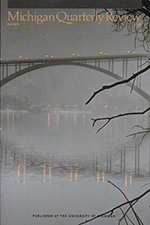 The Spring 2016 issue of Michigan Quarterly Review provides witness to the travesty of the water crisis in Flint, Michigan – only a stone’s throw from MQR’s home in Ann Arbor. Jonathan Freedman addresses the issue using Michigan’s state promotional campaign slogan “Pure Michigan” – aptly titling his editorial “Impure Michigan.”
The Spring 2016 issue of Michigan Quarterly Review provides witness to the travesty of the water crisis in Flint, Michigan – only a stone’s throw from MQR’s home in Ann Arbor. Jonathan Freedman addresses the issue using Michigan’s state promotional campaign slogan “Pure Michigan” – aptly titling his editorial “Impure Michigan.”
Like many who respond to this man-made disaster, Freedman points the blame directly as it should be: “The real impurity, then, extends from the polluted water to the polluted political system that allowed emergency managers to run cities without being answerable to them, to the cover-their-ass bureaucracy, to the governor who reverses Harry Truman’s credo by whining that the buck stops everywhere but his desk. The real impurity is the stupidity, selfishness and racism that is structural to the politcal system in this and far too many states.”
Included in the issue is “Flint and Beyond,” a special section on the Flint water crisis: Flint native Kelsey Ronan explores the effect on her family in “Blood and Water,” Tarfia Faizullah dedicates her poem “I Told the Water” to Flint, fiction by Matthew Baker, “Pheasants of Detroit,” and Jack Driscoll, “Calcheck and Priest” look at life in Michigan today.
Spread the word!
Books :: 2015 Kathryn A. Morton Prize in Poetry
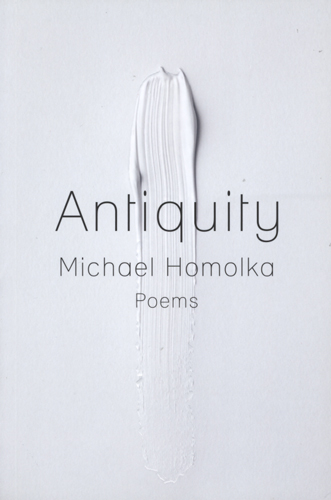 In July, readers can find copies of Michael Homolka’s debut poetry collection Antiquity on shelves. Homolka’s collection (with a cool, minimalist, textured cover) won the Sarabande Books Kathryn A. Morton Prize in Poetry in 2015 and was chosen by Mary Ruefle. Ruefle writes in her introduction, “The poems in Antiquity very much abandon themselves to language, to the collective poetic endeavor, and they do so in a rich, textured, and sustained voice . . . ”
In July, readers can find copies of Michael Homolka’s debut poetry collection Antiquity on shelves. Homolka’s collection (with a cool, minimalist, textured cover) won the Sarabande Books Kathryn A. Morton Prize in Poetry in 2015 and was chosen by Mary Ruefle. Ruefle writes in her introduction, “The poems in Antiquity very much abandon themselves to language, to the collective poetic endeavor, and they do so in a rich, textured, and sustained voice . . . ”
Readers can preorder copies of Antiquity from the Sarabande Books website, where advance praise can also be found.
Spread the word!
Books :: Spring 2016 Round-Up
With summer lurking around the corner, let’s hit the “pause” button and take a look back at some Spring 2016 books.
In March, Adrian C. Louis’s Random Exorcisms was published. Winner of the Lena-Miles Wever Todd Poetry Prize from Louisiana State University Press, Random Exorcisms is deeply rooted in Native American traditions and folklore, in a style entirely Louis’s.
The Girls in My Town by Angela Morales, published in April, was chosen as a past NewPages Editor’s Pick. The autobiographical essays in The Girls in My Town create an unforgettable portrait of a family in Los Angeles. Poignant, serious, and funny, Morales’s book is both a coming-of-age story and an exploration of how a writer discovers her voice, and won the River Teeth Literary Nonfiction Book Contest.
Also published in April, is the poetry collection lore by Davis McCombs, which won the Agha Shahid Ali Prize in Poetry through The University of Utah Press. Linda Bierds, who selected the winning piece, says, “In thirty-eight haunting poems, McCombs offers that something to us—a wholeness attained not only through the stories and traditions of a culture but through the fusion of poet and place, poet and past.”
Check out the three titles above and order copies for some beach reading.
Spread the word!
Detroit Muscle
Jeff Vande Zande burns the fat off our souls. At a recent poetry reading, the poet in residence, read a rather lofty ten lines about an experience in the California wilderness. Everyone stared ahead with reverence and when the poem finished, it was hard to tell if anyone noticed. He then told an anecdote about the origin of the poem. He used unpolished language and terse, powerful verbs, and, if I remember correctly, some foul language. Everyone laughed and looked around. I asked myself, “Why didn’t the guy write that as the poem?” Enter Vande Zande, who doesn’t settle for trying to sound like something. As a matter of fact, he almost eliminates pretense to a fault. He calls Detroit a “city of empty stories atop empty stories,” and in doing so strips the mystery from all of it while also alluding to that great hollow tale.
Spread the word!
The Dark Will End the Dark
Phobia is defined, by my handy dictionary app, as “an extreme or irrational fear or aversion to something.” It’s debatable whether or not Darrin Doyle, intends to further encourage and perhaps even expand the catalog of possible phobias one might adopt in a lifetime, or whether he hopes that by delving into the darkest regions of psychic subconscious, his stories might locate the irrationality of a reader’s particular fear and give it permission to come into the light. In either case, his collection of short stories and flash fictions entitled The Dark Will End the Dark promises to satisfy the most twisted reader and the busily-untwisting reader alike.
Spread the word!
Bonds of Love & Blood
Relationships are very complicated. They can either make us feel secure or alienate us. They define us in many ways and also become the symbolic representations of inner worlds we must face all by ourselves if we have to transcend and reach out to the real, brutal world outside. The collection of stories, Bonds of Love & Blood by Marylee MacDonald, explores intricate relationships within and outside familial ties and their effects on individuals who are involved in them. What sets this collection apart is the dominating theme of the collection: Fractured, failed, dead or dying, estranged relationships. These ties are problematic and layered for they cannot be salvaged, but they have a certain degree of intensity and beauty that makes them open-ended and real.
Spread the word!
Becoming the Sound of Bees
Marc Vincenz’s eighth collection of poetry, Becoming the Sound of Bees, is rich with disorienting imagery and descriptive language. Vincenz uses vocabulary reminiscent of an album by The Mars Volta, yet the music here is uniquely his own. Readers are transported to variously strange landscapes and introduced to poems brimming with noise.
Spread the word!
Four Cities
The world’s crying wolf when the words from a musical memory muscle through heartbreak and Middle Eastern melancholy before something sensational occurs: a compelling fresh poetic voice materializes. Hala Alyan’s Four Cities is a powerful reflection of a perception only seen from foreign skies. It somehow interweaves punk rock romanticism with a soft touch of bluegrass sensibilities (think Patti Smith with a touch of Old Crow Medicine Show). Her firecracker point of view radiates like Fourth of July on LSD. There is a lyrical sentimentality that shines sunlight over shadows. There is also tenderness in some passages where apathy would normally preside. Her poetical politics are worth every poignant line. “Sestina for December” reads like Parker prose but shines like a youthful Etal Adnan.
Spread the word!
Because
There is an easy-going quality to the poems in Nina Lindsay’s Because that make this one of the friendliest books this reviewer has read in some time. Lush but clean, emotional but evenly wrought, engaging a diversity of styles over its five sections but with a voice that feels continuous and familiar, these are the sorts of poems one can fall into a deep absorption with. That is not to say that these are intellectually easy—indeed, it is the subtle peculiarities and soft surprises we find throughout that really propel us forward through these pages, and I can’t help but think that this would be an interesting book to teach in advanced courses, precisely because it is so unassuming.
Spread the word!
Poetry: A Survivor’s Guide
Mark Yakich chose Carl Sandburg’s admonition, “Beware of advice, even this,” as his epigraph for Poetry: A Survivor’s Guide. But don’t jump to conclusions. This book is full of good advice, interesting asides and lively humor, while at the same time offering options. For example, Yakich writes: “Work on one poem at a sitting.” In the next paragraph it’s, “Work on multiple poems at a sitting.”
Spread the word!
The Smoking Section
Before we get started and you make suppositions from the title of this book, allow me to quote editor Lizzy Miles—founder of the Death Café of central Ohio where any participant is welcome to come and discuss issues of mortality—from the introduction: “Despite any appearances to the contrary, this is not a pro-smoking book; neither is it an anti-smoking book. This is not a commentary on smoking in society: this book captures our personal love/hate relationships with cigarettes and the habit of smoking.”
Spread the word!
Girl Power and Other Short-Short Stories
Girl Power and Other Short-Short Stories is divided into three sections exploring the trials and triumphs of a particular season in women’s lives: maidenhood, motherhood, and matronhood. Although the collection is organized in this way, Katie Cortese’s stories offer a landscape of women whose struggles vary widely. Some women deal with issues of sex and rape; others live in poverty or affluence; some are married, others are single; some are childless, others are mothers. Furthermore, the short-short stories in the collection slide between realistic and fantastic, reflecting Cortese’s ability to craft strong characters and plots regardless of genre.
Spread the word!
The Suicide Club
Through eight carefully linked stories, Toni Graham depicts the rituals of small-town Oklahoma and how its inhabitants move forward through life with—or in perhaps spite of—grief. The stories in The Suicide Club each follow one of four suicide survivors: a man whose father swallowed pills; a mother whose teenage son hung himself; a woman whose boyfriend shot himself; and the survivor group leader, whose father asphyxiated himself. The group’s Wednesday night meetings are only a sliver of full and messy lives as the members work through addictions, infidelity, impotency, and questions of faith.
Spread the word!
Wolf’s Mouth
John Smolens, a Marquette, Michigan writer, has written three novels set in the UP. The first, Cold, was about an escaped convict and his latest, Wolf’s Mouth, has to do with an Italian prisoner who escapes from a POW camp in Au Train, near Munising. Prisoners of war numbered 400,000 in camps across the U.S., and more than one camp existed in the Upper Peninsula (UP) of Michigan. This well-written novel offers fascinating information about the camps and especially how they were run, but is also a thriller with insights into human nature.
Spread the word!
Crab Fat Magazine Makes Changes
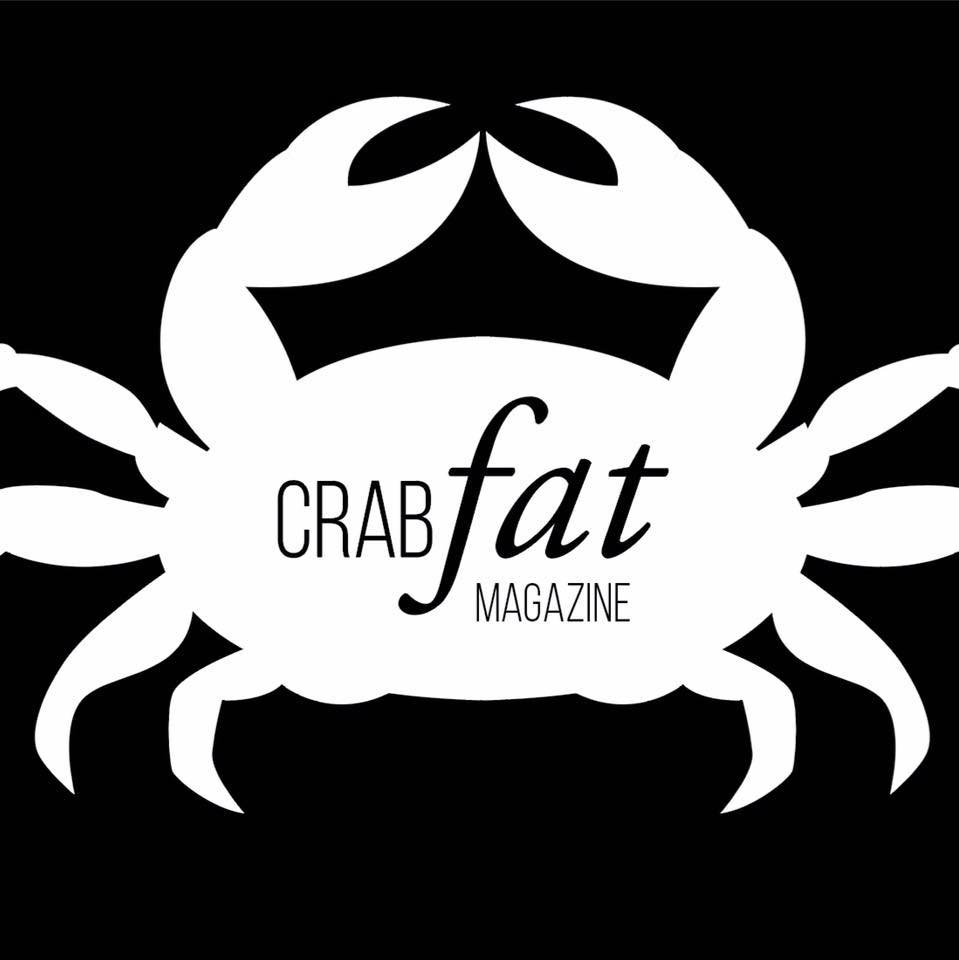 Crab Fat Magazine, the online literary magazine featuring feminist/queer work with a flair for the experimental, has made a few changes lately. Instead of publishing quarterly PDF issues, Crab Fat will now publish monthly online HTML issues (with the past PDF issues still archived and available online). Issue 8, published May 22, is the introduction to this new format. An annual “best of” print anthology will also be produced with the 2015 edition set to release later this month.
Crab Fat Magazine, the online literary magazine featuring feminist/queer work with a flair for the experimental, has made a few changes lately. Instead of publishing quarterly PDF issues, Crab Fat will now publish monthly online HTML issues (with the past PDF issues still archived and available online). Issue 8, published May 22, is the introduction to this new format. An annual “best of” print anthology will also be produced with the 2015 edition set to release later this month.
Spread the word!
Harry Potter Alliance Advocates and Activists
The American Library Association (ALA) joined the Harry Potter Alliance in launching “Spark,” an eight-part video series developed to support and guide first-time advocates who are interested in advocating at the federal level for issues that matter to them. The series, targeted to viewers aged 13–22, will be hosted on the YouTube page of the Harry Potter Alliance, while librarians and educators are encouraged to use the videos to engage young people or first time advocates. The video series was launched today during the 42nd annual National Library Legislative Day in Washington, D.C.
The video series provides supporting information for inexperienced grassroots advocates, covering everything from setting up in-person legislator meetings to the process of constructing a campaign. By breaking down oft-intimidating “inside the Beltway” language, Spark provides an accessible set of tools that can activate and motivate young advocates for the rest of their lives. The video series also includes information on writing press releases, staging social media campaigns, using library resources for research or holding events, and best practices for contacting elected officials.
Spread the word!
Books :: BOA Editions Award Titles
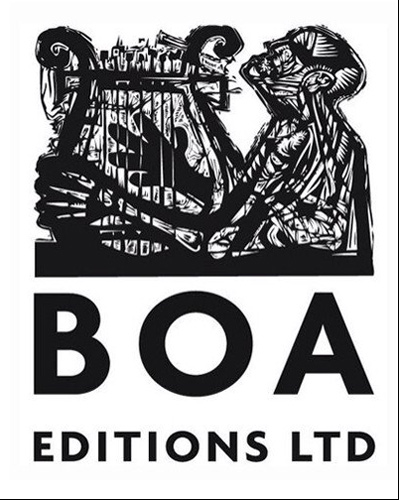 Out now from BOA Editions, LTD. is Remarkable by Dinah Cox, winner of the BOA Short Fiction Prize. From the publisher’s website:
Out now from BOA Editions, LTD. is Remarkable by Dinah Cox, winner of the BOA Short Fiction Prize. From the publisher’s website:
Set within the resilient Great Plains, these award-winning stories are marked by the region’s people and landscape, and the distinctive way it is both regressive in its politics yet also stumbling toward something better. While not all stories are explicitly set in Oklahoma, the state is almost a character that is neither protagonist nor antagonist, but instead the weird next-door-neighbor you’re perhaps too ashamed of to take anywhere. Who is the embarrassing one—you or Oklahoma?
In Fall, Kathryn Nuernberger’s poetry collection The End of Pink will be released. The winner of the 2015 James Laughlin Award, The End of Pink (Nuernberger’s second collection) is “populated by strange characters” and is “equal parts fact and folklore.” Copies are available for preorder at the BOA Editions, LTD. website.
Spread the word!
Books :: 11th Tartts First Fiction Award Winner
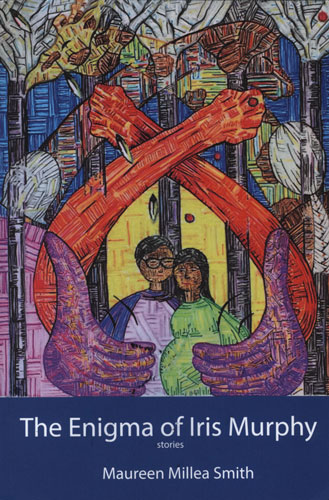 In July, look for Maureen Millea Smith’s The Enigma of Iris Murphy from The Livingston Press. Winner of the eleventh Tartts First Fiction Award, Smith’s short story collection looks at “A prison’s visitation room; a veterinarian who understands the thoughts of animals; an Omaha police sergeant; a banking executive who consoles her dying friend; a librarian who sleeps with giraffes—all linked by the life of Iris Murphy.”
In July, look for Maureen Millea Smith’s The Enigma of Iris Murphy from The Livingston Press. Winner of the eleventh Tartts First Fiction Award, Smith’s short story collection looks at “A prison’s visitation room; a veterinarian who understands the thoughts of animals; an Omaha police sergeant; a banking executive who consoles her dying friend; a librarian who sleeps with giraffes—all linked by the life of Iris Murphy.”
While awaiting its July release, readers can check out The Livingston Press’s website where they can find an excerpt from The Enigma of Iris Murphy and preorder a copy.
[quote from publisher’s website]
Spread the word!
Gulf Coast Prize Winners :: 2016
The summer/fall 2016 issue of Gulf Coast, in addition to a lot of great writing for their themed “Archive Issue,” includes winners from two of their contests:
The 2015 Gulf Coast Prize in Translation
Judged by Ammiel Alcalay
Winner ($1000 + Print publication)
Samantha Schnee for her translation from Carmen Boullosa’s The Romantics’ Conspiracy.
Honorable Mention ($250 + Online publication)
Rebeca Velasquez for her translation from Irma de Águila’s El hombre que hablaba del cielo, or The Man Who Spoke About the Heavens.
Brad Fox for his translation from Sait Faik Abasiyanik’s novella Havada Bulut, or A Cloud in the Sky.
Commendation
Jonathan Larson for his translation of Friederike Mayröcker’s études.
J. Bret Maney for his translation of Guillermo Cotto-Thorner’s Manhattan Tropics.
2015 Barthelme Prize for Short Fiction
Judged by Steve Almond
Winner ($1000 + Pring publication)
“Taylor Swift” by Hugh Behm-Steinberg
Honorable Mention ($250 + Print publication)
“The Deer” by Nickole Brown
“Threeway” by Wes Wrobel
Spread the word!
Hudson Review 2016 Fiction Contest Winners
The Hudson Review has announced the winners of their 2016 Short Fiction Contest:
First Prize ($500)
“The Comfort Weaver” by Alia Ahmed
“The Colonel’s Boy” by Timothy Dumas
Second Prize ($250)
“Leah, Lamb” by Dana Fitz Gale
“Shadow Daughter” by Leslie Pietrzyk
Honorable Mention
“Einhorn’s Kosher Palace” by David Klein
“Those Who Burn” by Lara Prescott
“The Wedding at Valocchio” by James Vescovi
Alia Ahmed’s “The Comfort Weaver” is published in the spring 2016 issue of The Hudson Review and is also available full-text on the publication’s website here.
Spread the word!
Chattahoochee Review 2016 Lamar York Prize Winners
The Lamar York Prize honors the founder and former editor of The Chattahoochee Review by awarding $1,000.00 each and publication to a winning story and essay. The 2016 winners appear in the spring 2016 issue.
Fiction Winner
Judged by Tayari Jones
“Y’all’s Problem” by Beth Ann Fennelly
Nonfiction Winner
Judged by Dinty Moore
“Trip” by Audrey Spensley
The Lamar York Prize is an annual contest that accepts submissions between October 1 and January 31.
[Cover art: The Baron in the Trees, 2011 by Su Blackwell; detail and artist’s statement included in the issue.]
Spread the word!
Kenyon Review EcoPoetry
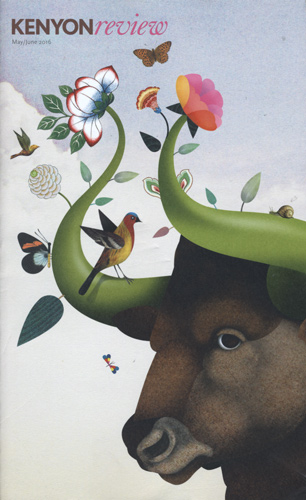 “Literature and the Anthropocene” is the title of The Kenyon Review Editor’s Notes in the May/June 2016 issue. The term ‘anthropocene, Editor David H. Lynn explains, is “a term coined by Paul Crutzen and Eugene Stoermer in 2000 to denote the current epoch, ‘in which many geologically significant conditions and processes are profoundly altered by human activities’ . . . As one response to these vast and accelerating changes we offer in this issue a special section of EcoPoetry, work that self-consciously addresses the relationship between the human and the natural world, gathered by our poetry editor David Baker. This is the second iteration—last year’s received wide acclaim—and my intention is that it will be an ongoing feature in our pages.”
“Literature and the Anthropocene” is the title of The Kenyon Review Editor’s Notes in the May/June 2016 issue. The term ‘anthropocene, Editor David H. Lynn explains, is “a term coined by Paul Crutzen and Eugene Stoermer in 2000 to denote the current epoch, ‘in which many geologically significant conditions and processes are profoundly altered by human activities’ . . . As one response to these vast and accelerating changes we offer in this issue a special section of EcoPoetry, work that self-consciously addresses the relationship between the human and the natural world, gathered by our poetry editor David Baker. This is the second iteration—last year’s received wide acclaim—and my intention is that it will be an ongoing feature in our pages.”
To further encourage the genre, the Kenyon Review Writers Workshop offers a nature writing session each summer. Collaborating with scientists at Kenyon College’s Brown Family Environmental Center, this workshop provides wrirters with guided scientific investigation, in labs and wetlands and woodland paths, along with time and strategies for writing. This nature writing workshop is one of several offered by the Kenyon Review.
[Cover art by Brett Ryder.]
Spread the word!
Books :: 2015 Permafrost Prize Series Award
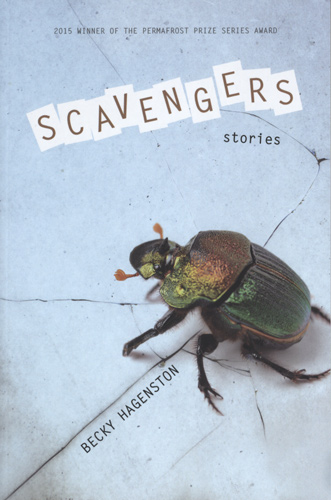 Becky Hagenston brought home the 2015 Permafrost Prize Series Award with her story collection Scavengers, chosen from nearly 150 entries. As the winner, Hagenston saw her collection (her third) published by the University of Alaska Press this year in both paperback and digital editions.
Becky Hagenston brought home the 2015 Permafrost Prize Series Award with her story collection Scavengers, chosen from nearly 150 entries. As the winner, Hagenston saw her collection (her third) published by the University of Alaska Press this year in both paperback and digital editions.
From the publisher’s website:
These are the people and situations—where the familiar and bizarre intermix—that animate Becky Hagenston’s stories in Scavengers. From Mississippi to Arizona to Russia, characters find themselves faced with a choice: make sense of the past, or run from it. But Hagenston reminds us that even running can never be pure—so which parts of your past do you decide to hold on to?
An unforgettable read, Scavengers is now available.
Spread the word!
Alaska Quarterly Review on Poems and Painting
 The spring/summer 2016 issue of Alaska Quarterly Review includes the special feature “Sparks: A Conversation in Poems and Paintings” with Poet Peggy Shumaker [pictured] and Artist Kes Woodward.
The spring/summer 2016 issue of Alaska Quarterly Review includes the special feature “Sparks: A Conversation in Poems and Paintings” with Poet Peggy Shumaker [pictured] and Artist Kes Woodward.
From the Introduction: “This collaboration began when two friends decided to share an artistic conversation. Kes Woodward asked Peggy Shumaker to write a poem, and he created a painting in response to it. Peggy wrote in response, Kes painted in response, again and again. As each piece added its vividness to the conversation, both writer and artist found they were responding not just to the last piece, bu to the entire body of work. The work has taken many unpredictable and startling turns, adding to the intensity of this third art – an art that’s not language alone, not purely painting, but the bonding of the two.”
Spread the word!
Briar Cliff Review Contest Winners
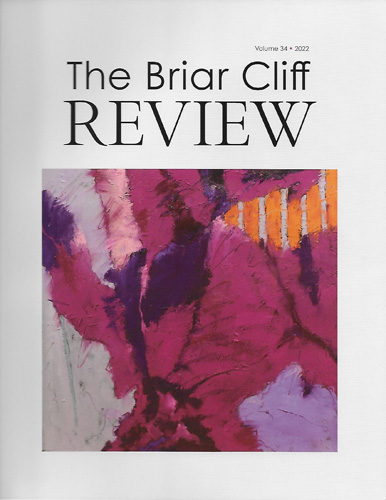 Volume 26 of The Briar Cliff Review includes the winning entries from their 2015 annual writing contest.
Volume 26 of The Briar Cliff Review includes the winning entries from their 2015 annual writing contest.
Poetry Winner
“Midwinter, My Mother” by Laura Apol
Fiction Winner
“Thirty and Out” by S.J. MacLean
Nonfiction Winner
“On Kindness” by Laura S. Distelheim
In addition to publication in the gorgeous full-size format print copy – which includes full color art throughout – winners receive $1000 each. This annual contest runs from August 1 – November 1 of each year.
Spread the word!
Have Book Will Travel
 You know you’ve got a great idea when you create something that makes others say, “IT’S ABOUT TIME SOMEONE DID THAT!”
You know you’ve got a great idea when you create something that makes others say, “IT’S ABOUT TIME SOMEONE DID THAT!”
Founded by Author and Editor Neil Aitken, Have Book, Will Travel is a searchable database of authors willing to travel, reading series currently seeking guest writers, and venues available for booking events. “Our goal” writes Aitken, “is to develop Have Book Will Travel into a valuable online resource that will make the task of planning a reading or a book tour easier and less confusing for all involved. We also encourage instructors and schools where budgets might be too tight to fly an author in for a reading, to consider bringing an author in via Skype for a classroom discussion or a video conference reading. By creating a central repository of information, we seek to simplify the search and to make more authors available to more venues.”
Authors can add themselves to the database, as can hosts of reading series and managers of bookstores, galleries, libraries, theatres, restaurants, or other types of performance venues for authors. On the flip side, users can search or browse the full lists of authors, series, and venues or search each by state and province in Canada. Some of these links don’t have much or anything just yet, which means there’s room for you to get in there and “add”! Sign up authors, series and venues!
Spread the word!
Booth – 2016
Booth never fails to present a beautiful product, and Issue 9 is no exception. In fact, it’s such a beautifully produced issue, I wrote notes about it in a separate journal, unable to bring myself to scribble in the margins and ruin a good thing. A green color scheme starts on the cover with art by Jillian Nickell—a house on a hill that’s actually a sleeping creature’s back—and carries through the entire issue. Even the inside cover flaps are donned with colorful art. Luckily, the editors put in just as much care in their writing selections, so readers guilty of judging books by covers will not be disappointed when they read the work this issue of Booth holds.
Spread the word!
Sonic Boom – April 2016
Sonic Boom is a journal “for writing that explodes.” Even the cover art of the April 2016 issue explodes with rich colored graffiti, a photograph by Kyle Hemmings. Issues start out in the Poetry Shack, then move on to Paper Lanterns—a section for haiku, tanka, senryu, and other Japanese forms—before continuing on to prose, art, and an interview, with 64 total contributors found in this issue alone.
Spread the word!
Bop Dead City – 2016
The 15th issue of Bop Dead City was released last month with the theme “Dreams,” a dreamlike state carrying over to much of the work in this issue.
Spread the word!
Typoetic.us – 2015
Typoetic.us is a play on words, on the url and its own name (Typoeticus: ending like so many Greek names with the -ticus), and just a downright playful poetry journal. But don’t take playful to mean light and frivolous; rather, playful in the way that us literarians appreciate. The featured writers skillfully play with language, sound, emotion, and experience, and as readers, we are invited along as playmates. With the variety of styles the editorial sense includes, no one is left out.
Spread the word!
CALYX – Fall 2015
Since 1976, CALYX has published art and literature by women. Senior editor Brenna Crotty describes this issue as a “search for meaning and identity.” More specifically, this issue resembles Cindy Cotner’s cover art, “Becoming.” The contributors examine how we become who we are, even as we grapple with the fact that often there is no recipe and no completion. Becoming is a continuous process.
Spread the word!
Prairie Schooner – Winter 2015
NBA, NFL, NHL, MLB, Premier League, Bundesliga, La Liga—if you are reading or dare say, published in Prairie Schooner’s Winter 2015, then you’re playing in the big leagues; say good-bye to the minors, enjoy your box-seats, and greet Natalie Diaz as the guest commissioner.
Spread the word!
Become an Official Teens’ Top Ten Book Group
Coming in August 2016, library staff may apply on behalf of their teen book groups for a chance to become one of fifteen Teens’ Top Ten official book groups with Young Adult Library Services Association (YALSA) of the American Library Association (ALA). The fifteen book groups will carry out a 2 year term, which will take place from January of 2017 through December 31, 2018. The official book groups are responsible for reading, submitting reviews, and nominating titles for the Teens’ Top Ten list.
Interested groups may sign up for updates about the application period here. Learn more about the book group project and eligibility requirements here.
The Teens’ Top Ten is a “teen choice” list, where teens nominate and choose their favorite books of the previous year. Nominators are members of teen book groups in fifteen school and public libraries around the country. Nominations are posted the Thursday of National Library Week.
Spread the word!
School Library Research Journal Seeks Co-editor
The American Association of School Librarians (AASL), a division of the American Library Association (ALA), is seeking a Co-editor with experience in scholarly research and publishing for its online journal, School Library Research. Click here for a full position description. Qualifications include PhD, EdD, or equivalent terminal degree and tenure or tenure-track faculty status at a college or university. Applications are due June 6, 2016.
Spread the word!
Nominate Top Teen Titles
The Young Adult Library Services Association (YALSA) of the American Library Association (ALA) has announced that teens aged 12-18 can now nominate their favorite titles to be considered as a 2017 Teens’ Top Ten nominee via the public nomination form.
In previous years, nominations were limited to the official Teens’ Top Ten book groups while the voting process for the official “top ten” titles was open to the public. In efforts to ensure that the “top ten” better reflect the opinions of teens everywhere, nominations for the preliminary round of nominees is open to the public. Book title nominations submitted in the current year will be used for consideration of the following year’s list of nominees. Teens can submit a book title now through December 31, 2016 to be included in the pool of the 2017 nominee candidates. For books to be eligible for consideration, they must be published between January 1– December 31, 2016.
Submit a suggested title via the public nomination form here.
Spread the word!
Black Warrior Review 11th Annual Contest Winners
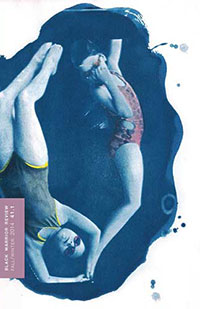 The Spring/Summer 2016 issue of Black Warrior Review features the winners of the publication’s 11th Annual Contest in Prose, Poetry, and Nonfiction. Each winner received $1,000 and publication; each runner-up received $100.
The Spring/Summer 2016 issue of Black Warrior Review features the winners of the publication’s 11th Annual Contest in Prose, Poetry, and Nonfiction. Each winner received $1,000 and publication; each runner-up received $100.
Fiction judge Alissa Nutting selected “The Twins” by Jill Rosenberg as the winner and “Fellowship” by Kimberly Parsons as the runner up.
Poetry judge Heather Christle selected “b careful” by Mark Baumer as the winner and “Wolfmoon” by Mary-Alice Daniel as the runner-up.
Nonfiction judge Mary Roach selected “Huron River Drive” by Will McGrath as the winner and “Three Great Lyric Passages” by Hugh Martin as the runner up.
Judges’ comments on the winning works and a full list of all the finalists can be found here.
